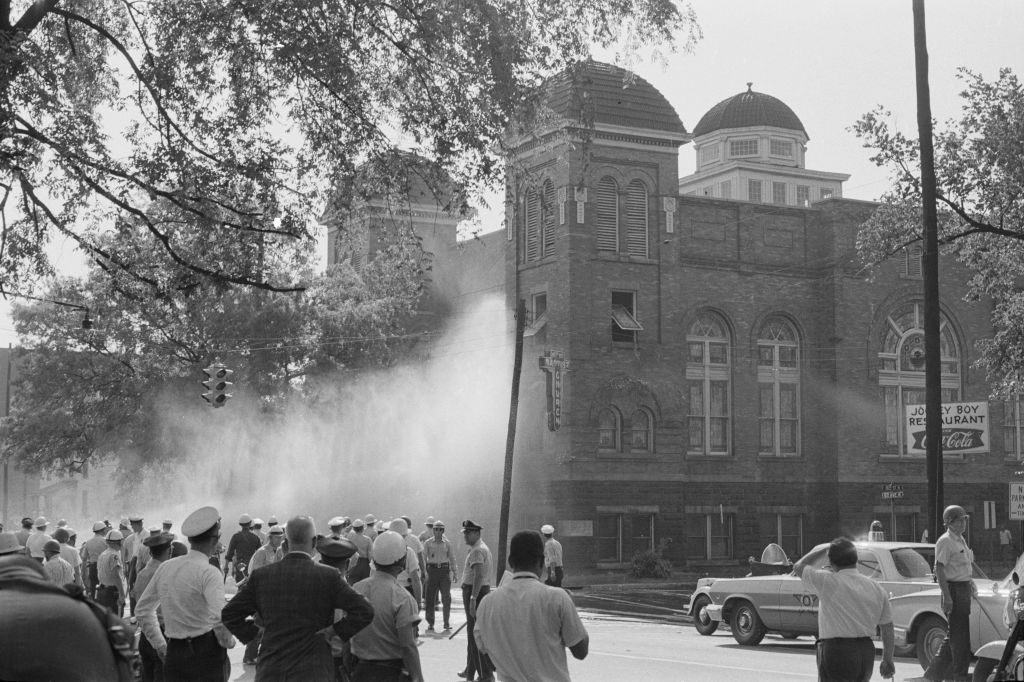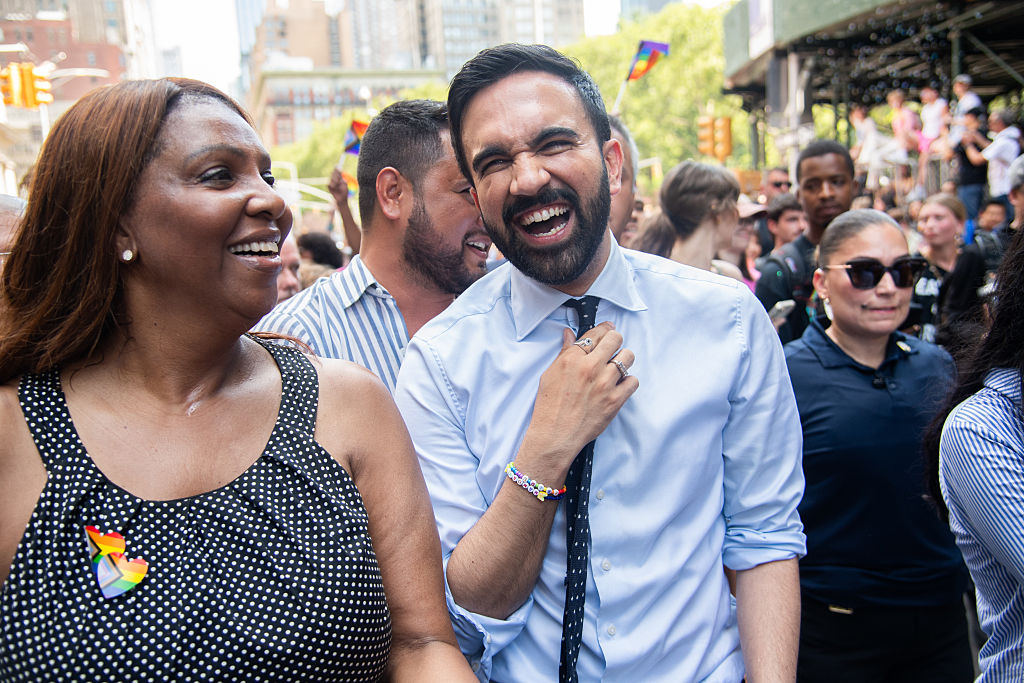LGBTQ Pride, Politics: Florida State Rep Michele Raynor Q&A
Florida State Rep. Michele Raynor Talks LGBTQ+ Community’s Intersection With Religious Spaces
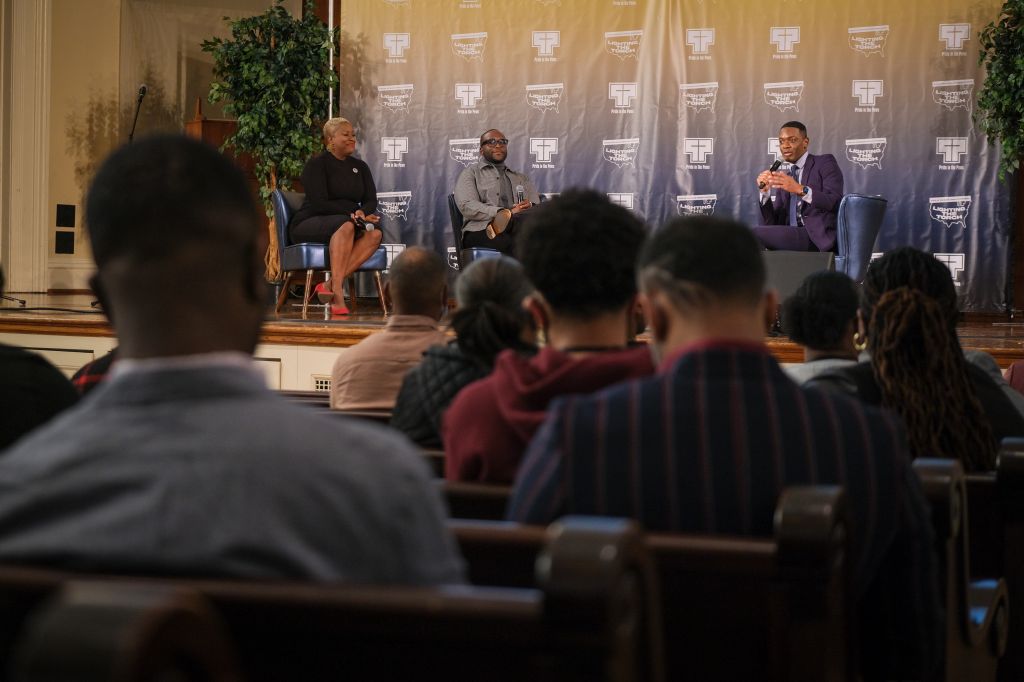
From left: Florida State Rep. Michele Raynor, Florida State Sen. Shevrin Jones and journalist Gerren Keith Gaynor at the “State of The Black Church Symposium” in Atlanta on Feb. 2, 2024. | Source: Dr. Ralph Basui Watkins/Pride in the Pews
Bridge building, political positioning and transparency were the backbone of the Pride in Politics Fireside chat that opened Pride In The Pews’ two-day “State of The Black Church Symposium” at Spelman College in Atlanta last weekend.
Bearing a wealth of concerns about the political and religious protections of the LGTBQ+ community, attendees heard honest and tactical takes from panelists, Florida State Sen. Shevrin Jones and Florida State Rep. Michele Raynor.
MORE: ‘Pride In The Pews’: Religious LGBTQ+ Reform Efforts Explore State Of The Black Church
During the conversation moderated by journalist Gerren Keith Gaynor, the two elected officials shared the layers of their advocacy efforts, battles on the political frontlines, powerful testimonials about the connections between their sexuality and political plights and their hopes for future leaders.
Jones emphasized the need for proactive and not reactive measures from those in and out of political office and stressed the responsibility we all bear in moving the needle toward more political representation and protections for the Black LGTBQ+ community.
With a record of more than 510 anti-LGTBQ+ bills being introduced in 2023, Don Abram — founder and executive director of Pride In The Pews, a nonprofit group empowering the Black LGBTQ+ community — echoed Jones’ sentiments and stressed a sense of urgency in response to recent statistics.
“LGBTQ+ folk are under attack, and I believe people of faith and conviction should have something to say about that…we are seeing that black, queer, LGBTQ+ Christians have always had something to say in the public square, and this conversation is indicative of that,” Abram said.
The relationship between “The Church” and the LGTBQ+ community has been a source of contention for decades. Friday’s panel tackled some sources of “church hurt” that ranged from non-acceptance to ridicule and isolation.
When asked what white flag she’d like to raise to the church at large, Raynor candidly replied, “I would say, love for real. Love everyone who comes into your doors whether you understand it or not, because love is actually the thing that will change the world.”
With multiple concerns expressed during the symposium, heartfelt stories told and several things yet to be done politically, socially and in the religious sphere, Raynor prescribing “love” as the cure seems appropriate.
Moving beyond the symposium’s events means taking the next steps toward substantive change, and Abram said he is optimistic about taking them with Pride In The Pews at the helm.
When examining the nature and impact of the conversations the organization is fostering, it’s only fair to assume its elevation will continue.
With excitement in his tone and a smile on his face, Abram said, “Our goal is to put more money and energies behind programming that centers the public square…from faith leaders to institutional leaders to church leaders we want them all to see that we cannot talk about progress without talking about faith, and there’s a way we can do that that includes everyone.”
NewsOne.com contributor Sharí Nycole sits down with State Black Church Symposium panelist and Florida House Rep. Raynor to shed light on the LGBTQ+ community and its intersection with religious spaces.
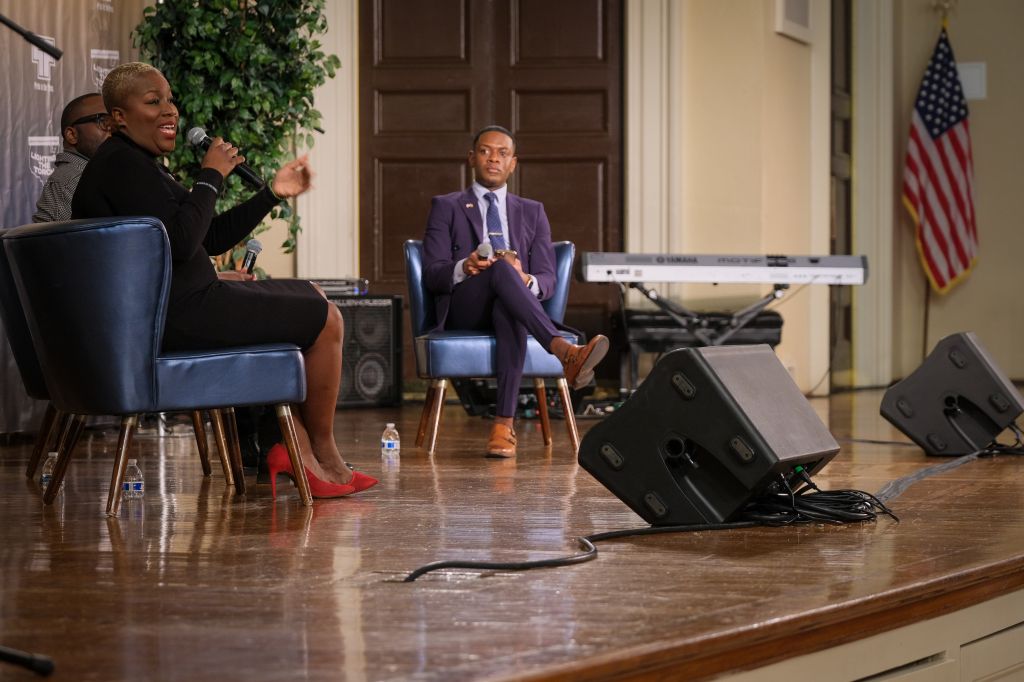
Florida State Rep. Michele Raynor speaks. | Source: Dr. Ralph Basui Watkins/Pride in the Pews
NewsOne (NO): First of all, I was really impressed with just the transparency that you continue to allude throughout the conversation. How important is it for you, especially as someone who’s a government official, to be transparent, especially relating to a subject like this?
Raynor: I think that’s what everyone wants to see. They want to see themselves reflected in people who are leading them and people who are representing them. And I really think that it’s very hard for me to be anybody then who I’m not. I just lean into that and some people receive it, some people don’t. But that’s how I show up. So for me, it’s super important to be transparent. And also it’s important because you never know what you may say, what your lived experience may do to touch someone or maybe to help someone. And so that to me is super important about this part of like my ministry of just leaning into that.
NO: You talked a lot about intersectionality as well, which I think was a really key thing. Forums like this, how do they give you opportunities to continue to not only talk about the needs, but also talk about like the gains as well?
Raynor: I think forums like this show that there are gains being made, right? There are gains that are happening in our community. Four or five years ago, Pride In The Pews wouldn’t have even been a thing. And we’re here now, so we’re able to talk about it from that level, but also to still highlight with every gain that we’re making, there’s still so far to go and as far to go as Black people, as queer people as, you know, someone who identifies as a cisgendered woman. But all of those all of those identities that I have, there’s so far to go all in one, but also in the separate identities, if that makes sense.
NO: If you could raise just one big white flag to the church at large, what would that be and why?
Raynor: I would say love for real love. Love everyone that comes into your doors, whether you understand it or not. Because love is actually the thing that will change the world.
NO: Speaking of “change the world,” I think the cross-generational piece of the conversation was really important as well. And you mentioned, obviously that we’re in an election year. How are you bracing yourself right now? And what do you hope to see across generationally as we move forward?
Raynor: I hope to see that people will get out and they will vote. I have folks and friends I see on socials that they are apathetic. They’re apathetic with what they’re seeing happening in Gaza. They’re apathetic with what they’re seeing happening in other places. But I also am very clear that I think President Biden is doing a fantastic job. And I think that we have to stay the course. And I think that it’s incumbent upon us to understand that if someone else should get in the office, even the gains we just have made in these last four years to recover from what happened the prior four years, we will lose those gains. And I think the issue is so interesting to me. We had a foreign president who was very ostentatious, very loud, very boisterous about everything that he did. And we have a president now in Joe Biden who is not as loud, but he does the work. He actually does the work. So understanding that he is doing the work and for us to make sure that we support that and get out and make sure he is reelected, because I will not be able to be to have another presidency of that. No, no, no. My mental health during that time [laughs].
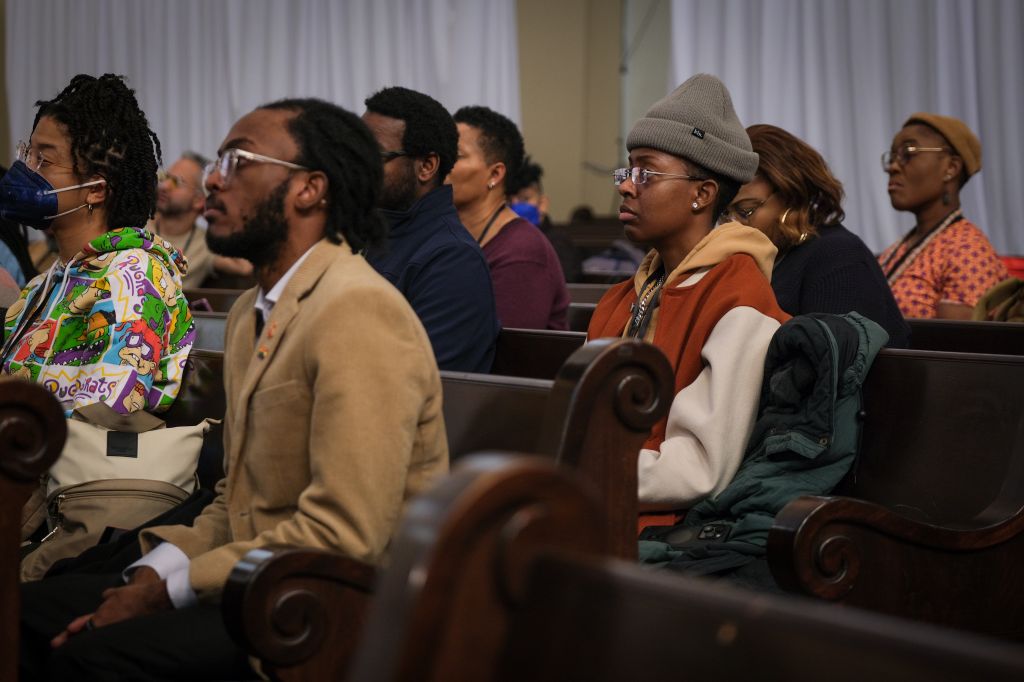
Attendees at the “State of The Black Church Symposium” in Atlanta on Feb. 2, 2024. | Source: Dr. Ralph Basui Watkins/Pride in the Pews
NO: How do you gauge the pulse? Q&As are always interesting to me because the questions are always really profound, which I thought was the case today. In listening to the questions and answering them, what is the temperament you feel that’s kind of brewing? Especially here in Atlanta specifically?
Raynor: Atlanta, Georgia is kind of like Florida, right? It’s like we’re like sisters, you know, you’re a little bit more tame than us, but still. I think really listening to people. What I always feel like the temperature is, is that people really want to know, how are you going to meet my needs? Like, what’s going on? My kid is trying to go to school. I’m trying to make sure that we got food on the table. I’m trying to make sure all of these other things are happening. How are these needs being met? And I think that that’s what I really hear and what I really feel.
NO: Church form is a real thing, especially as it relates to the LGBTQ community. How would you advise those of us who are going to be casting our vote, those who are part of the LGBTQ community, to not have a trauma response to how they make decisions as it relates to their best interest politically?
Raynor: That’s a hard thing, because I think we’re all kind of dealing with our own trauma, our own church hurt or all of those things. I think one is just to really have thoughts and work that’s rooted in liberation and all of us getting free. Not just our own individual freedom and our individual hurt, but all of us getting free. What does that look like? Also, I would say, talk to someone, you know what I mean? There’s a collective trauma that we’re feeling and there’s collective church hurt that we’re feeling. So I think that when we’re centering liberation for us all, that’s important, but also making sure that we are taking care of ourselves.
NO: Last question for you. What would you like the next iteration of this level of conversation that you guys had to be?
Raynor: I would love to see the next iteration really be just more like us having it on a global level. I know that we talked a lot about the global aspect of this, really having that conversation on a global level and really being able to do that. I think that would be really important because there is what we’re fighting for here in the United States, we’re seeing also in the diaspora as well.
This article was contributed in partnership with our sister site Elev8.com, launching this year. For more Christian-centered and wellness news, follow @Elev8inspo on social media.
SEE ALSO:
The Bible And Black People: A Torrid Love Affair
Black Churches In Florida Are Teaching Non-Whitewashed Black History Since The State Won’t
